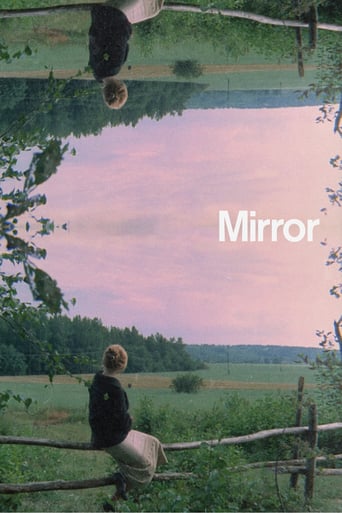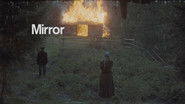Kirpianuscus
always, each film of Tarkovsky , for me, is a church. in few cases, a cathedral. and this gives to him the advantage to be more than a remarkable director or a wise teller. "The Mirror" is a brilliant example. fragments of life. in not precise order. absence of story. each scene - a picture from a lost place. mixture of lives. and suggestion. and, in a moment, the feeling to be fragments from your life. all is beautiful and bitter and strange and familiar. because it is the story of a century. and its confession. because it is just a basket with memories. defining purposes and needs and expectations and words. because all is touching. and far. because, long time after its end, I preserved from it only the image of the mother of Tarkovski. as the mother. because it is a walk on the water. using as steps the presence of Arseny Tarkovsky and his poetry. the image of Oleg Yankovsky. and the look of the boy in the mirror. a film for who the descriptions/ definitions do not works. so, see it. for a form of view with yourself.
Leofwine_draca
THE MIRROR is another art-house drama by Russian director Andrei Tarkovsky. I'm no fan of this guy, so I'll keep my thoughts brief. In terms of visuals, this film is very good, well thought out, with carefully constructed compositions and the like. Tarkovsky would make a good painter and his style reminded me a little of Herzog's HEART OF GLASS. As for the rest, it's typically long-winded, personal, boring, and familiar from the rest of his work. The characters are dull and the plot events strive for meaning but feel quite obtuse. The only part of this I found interesting from a historical perspective is the segment detailing Communist China.
georgiturlakov
This is such a great movie, it was a pleasure to watch. I haven't seen such beautiful pictures in any other movie. They just open up your imagination - delicate and touching, stunning harmony. Every frame of Tarkovsky is a work of art. He just shows how it's done. You have to see it if you are a movie fan but if you are a Russian - it is an obligation.
samanthamarciafarmer
Tarkovskii's Mirror is profoundly episodic in that it consists almost exclusively of dredged up memories, real or imagined, from the life of the central figure, Alexei. The structure is nonlinear, but the viewer never seems to get caught up on the slight confusion created by this. The only aspect that truly hinders understanding is the decision to have Terekhova play not only Alexie's wife but also his mother; one is always a little unsure of which time sequence the film is in. This uncertainty can only be intentional as it enhances the overall theme of the fallibility of human memory. The viewer, however, is oftentimes too distracted by Tarkovskii's beautiful sequences to mind having to untangle the nonlinear plot. The camera follows characters like an unseen eye, although occasionally veers off to focus on a seemingly-unrelated poetic image, like a vase that slowly falls off the edge of a table. The color cinematography saturates the world in a dreamlike palette, such as the early scene in which Alexei's mother sits on a fence in the Moscow countryside. When Tarkovskii switches abruptly to sepia and black and white tones, it's hardly noticeable, and is remarkably well done. Surrealist elements are interspersed, such as the scene in which Maria washes her hair as plaster falls all around her and water floods the house. These instances, combined with the occasional poem narrations, make the disjointed remembrances even more dreamlike. At the end of the film, it is still unclear what exactly the viewer has seen, and another viewing is necessary. The memorable scenes stick in one's head just as much as casual pans of the camera. Tarkovskii's Mirror is full of something, and it's just not clear yet what that something is.







